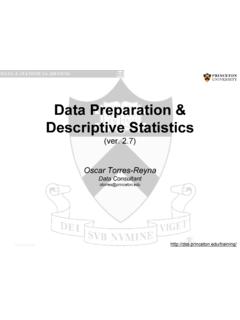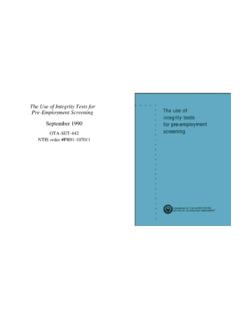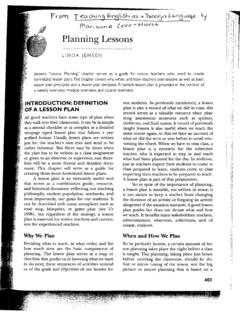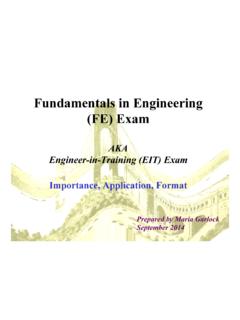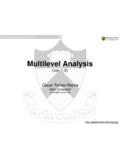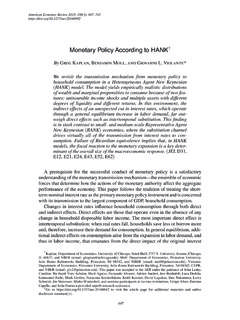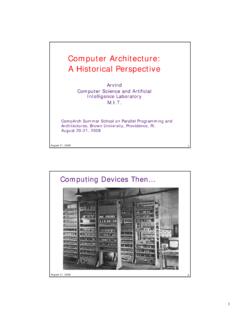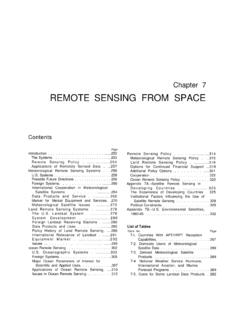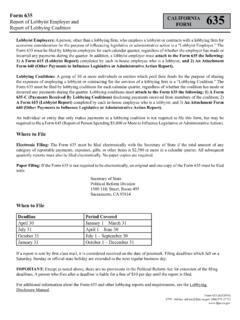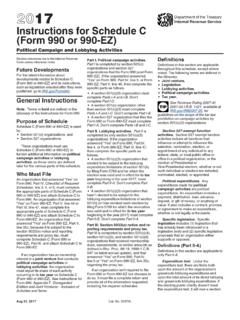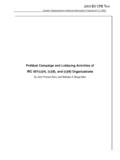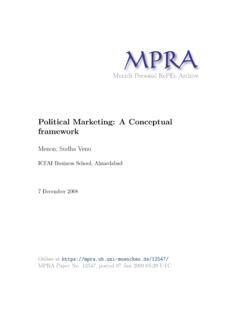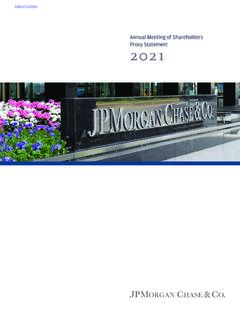Transcription of Political Game Theory - Princeton University
1 Political Game Theory Nolan McCarty Adam Meirowitz To Liz, Janis, Lachlan, and Delaney. Contents Acknowledgements vii Chapter 1. Introduction 1. 1. Organization of the Book 2. Chapter 2. The Theory of Choice 5. 1. Finite Sets of Actions and Outcomes 6. 2. Continuous Outcome Spaces* 10. 3. Utility Theory 17. 4. Utility representations on Continuous Outcome Spaces* 18. 5. Spatial Preferences 19. 6. Exercises 21. Chapter 3. Choice Under Uncertainty 23. 1. The Finite Case 23. 2. Risk Preferences 32. 3.
2 Learning 37. 4. Critiques of Expected Utility Theory 41. 5. Time Preferences 46. 6. Exercises 50. Chapter 4. Social Choice Theory 53. 1. The Open Search 53. 2. Preference Aggregation Rules 55. 3. Collective Choice 61. 4. Manipulation of Choice Functions 66. 5. Exercises 69. Chapter 5. Games in the Normal Form 71. 1. The Normal Form 73. 2. Solutions to Normal Form Games 76. 3. Application: The Hotelling Model of Political Competition 83. 4. Existence of Nash Equilibria 86. 5. Pure Strategy Nash Equilibria in Non-Finite Games* 93.
3 6. Application: Interest Group Contributions 95. 7. Application: International Externalities 96. iii iv CONTENTS. 8. Computing Equilibria with Constrained Optimization* 97. 9. Proving the Existence of Nash Equilibria** 98. 10. Strategic Complementarity 102. 11. Supermodularity and Monotone Comparative Statics* 103. 12. Refining Nash Equilibria 108. 13. Application: Private Provision of Public Goods 109. 14. Exercises 113. Chapter 6. Bayesian Games in the Normal Form 115. 1. Formal Definitions 117.
4 2. Application: Trade restrictions 119. 3. Application: Jury Voting 121. 4. Application: Jury Voting with a Continuum of Signals* 123. 5. Application: Public Goods and Incomplete Information 126. 6. Application: Electoral Competition under Uncertainty 127. 7. Application: Campaigns, Contests and Auctions* 131. 8. Existence of Bayesian Nash equilibria* 133. 9. Exercises 134. Chapter 7. Extensive Form Games 135. 1. Backward Induction 138. 2. Dynamic Games of Complete but Imperfect Information 140.
5 3. Subgame Perfection and Perfect Equilibria 144. 4. Applications 145. 5. Exercises 158. Chapter 8. Dynamic Games of Incomplete Information 161. 1. Perfect Bayesian Equilibria 163. 2. Application: Entry Deterrence in Elections 172. 3. Application: Information and Legislative Organization 178. 4. Application: Informational lobbying 183. 5. Refinements of Perfect Bayesian Equilibrium* 186. 6. Exercises 195. Chapter 9. Repeated Games 199. 1. The Repeated Prisoner's Dilemma 200. 2. The Grim Trigger Equilibrium 202.
6 3. Tit-for-Tat Strategies 203. 4. Intermediate Punishment Strategies 204. 5. The Folk Theorem* 206. 6. Application: Interethnic Cooperation 208. 7. Application: Trade Wars 213. 8. Exercises 215. CONTENTS v Chapter 10. Bargaining Theory 217. 1. The Nash Bargaining Solution 217. 2. Non-cooperative Bargaining 222. 3. Majority Rule Bargaining Under Closed Rule 226. 4. Bargaining with Incomplete Information 234. 5. Application: Veto Bargaining 235. 6. Application: Crisis Bargaining 244. 7. Exercises 254.
7 Chapter 11. Mechanism Design and Agency Theory 257. 1. The Mechanism Design Problem 260. 2. Applications 263. 3. Incentive Compatibility and Individual Rationality 274. 4. Constrained Mechanism Design 276. 5. Mechanism Design and Signaling Games 291. 6. Exercises 295. Chapter 12. Mathematical Appendix 299. 1. Sets and Functions 301. 2. The Real Number System 304. 3. Points and sets 306. 4. Continuity of Functions 308. 5. Correspondences* 310. 6. Calculus 311. 7. Probability Theory 324. Bibliography 335.
8 Acknowledgements The origin of this book lies in the utter inability of either of its authors to write legibly on a black board (or any other surface, for that matter). To save our students from what would have been the most severe form of pedagogical torture, we were forced to commit our lecture notes to the electronic form. This also compensated for our inability to spell without the aid of a spell We ultimately decided that all of the late nights spent typesetting game Theory notes should not go in vain.
9 So we undertook to turn them into this book, which of course, led to more late nights spent typing. We hope these weren't wasted either. We are most grateful to the students at Columbia and Princeton on whom early versions of our notes and manuscript were inflicted. Puzzled looks and panicked o ce hours helped us to figure out how convey game Theory to students of politics. We also benefited from early conversations with Chris Achen, Scott Ashworth, Larry Bartels, Keith Krehbiel, David Lewis and Thomas Romer on what a book on Political game Theory ought to look like.
10 Along the way Stuart Jordan and Natasha Zharinova have provided valuable assistance and feed- back. Finally, our greatest debts are to those who taught us Political game Theory : David Austen-Smith, Je rey Banks, David Baron, Bruce Bueno de Mesquito, Thomas Romer, and Howard Rosenthal. Nolan McCarty Adam Meirowitz Princeton NJ. 1. Our mispelling styles are quite distinctive, however. For a given word, Mc- Carty uses completely random spellings while Meirowitz consistently mispells the word in the exact same way.
